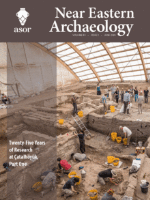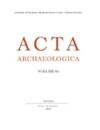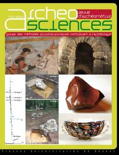
Revue Archeologique du Centre de la France
metrics 2024
Fostering Dialogue on Central France's Archaeological Legacy
Introduction
Revue Archeologique du Centre de la France is a prestigious academic journal dedicated to the field of archaeology, with a special focus on the rich historical and cultural heritage of central France. Published by FED EDITION REVUE ARCHEOLOGIQUE CENTRE FRANCE, this journal has been an open-access platform since 2004, ensuring that researchers, professionals, and students can freely access cutting-edge archaeological findings and scholarly discussions. With an acute emphasis on disseminating knowledge and fostering ongoing dialogue in archaeology, Revue Archeologique du Centre de la France serves as a vital resource for those keen to explore the complexities of French archaeological studies. Housed in Tours, this journal not only highlights regional heritage but also situates it within broader archaeological frameworks, making it an essential contribution to the field. Researchers can look forward to engaging with a diverse array of articles that cover both theoretical and applied aspects of archaeology, bolstering the understanding of our shared past.
Metrics 2024
 -
- 0.10
0.10 -
- -
-Metrics History
Rank 2024
JCI (Web Of Science)
Quartile History
Similar Journals

Cuadernos de Prehistoria y Arqueologia-Universidad Autonoma de Madrid
Connecting Researchers to the Rich Tapestry of HistoryCuadernos de Prehistoria y Arqueologia-Universidad Autonoma de Madrid is a distinguished academic journal dedicated to the fields of archaeology and prehistory, published by the Universidad Autonoma de Madrid, Departamento de Prehistoria y Arqueología. With an ISSN of 0211-1608, this journal plays a crucial role in disseminating significant research findings and theoretical advancements within these domains. Recognized for its scholarly excellence, it holds impressive quartile rankings in 2023, including Q2 in Archaeology and Q1 in History, reflecting its high impact within the academic community. While currently not an open-access publication, Cuadernos de Prehistoria y Arqueologia provides valuable insights to researchers, professionals, and students engaged in the exploration of human history and cultural heritage from 2018 to 2024 and beyond. With a commitment to fostering interdisciplinary dialogue, this journal serves as an essential platform for innovative studies and comprehensive reviews, contributing to the advancement of knowledge in archaeology and prehistory.

NEAR EASTERN ARCHAEOLOGY
Bridging Past and Present Through Archaeological InquiryNEAR EASTERN ARCHAEOLOGY, published by University of Chicago Press, is a premier journal dedicated to the field of archaeology, particularly focusing on the rich cultural heritage and archaeological findings of the Near East. With an ISSN of 1094-2076 and an E-ISSN of 2325-5404, this esteemed publication provides a vital platform for scholars and practitioners to share their research, insights, and discoveries. The journal holds an impressive ranking in the Q1 quartile for both Archaeology and History in 2023, reflecting its significant impact within these fields and a robust history of scholarly contribution. The journal has been pivotal in shaping discussions around archaeological methodology, theory, and contemporary issues from 2002 to 2024, as it continues to reach a wide audience through various access options. With Scopus rankings placing it in the top percentiles for both History and Archaeology, NEAR EASTERN ARCHAEOLOGY represents an essential resource for researchers, professionals, and students alike, fostering the exploration and understanding of the region's archaeological narrative.

ACTA ARCHAEOLOGICA
Pioneering Discoveries in the World of ArchaeologyACTA ARCHAEOLOGICA is a highly regarded, peer-reviewed journal published by BRILL, focusing on the dynamic field of archaeology. With an ISSN of 0065-101X and an E-ISSN of 1600-0390, this journal disseminates innovative research, critical analyses, and comprehensive reviews that contribute to our understanding of human history, cultural heritage, and archaeological methodology. ACTA ARCHAEOLOGICA has excelled in its field, achieving a Q1 ranking in both the Arts and Humanities and Social Sciences categories for 2023, showcasing its impact and relevance in scholarly discourse. Though not currently open access, the journal caters to a diverse audience of researchers, professionals, and students, offering invaluable insights into archaeological studies from a global perspective. As it continues to foster academic dialogue, ACTA ARCHAEOLOGICA remains a cornerstone for those looking to deepen their knowledge and engage with cutting-edge archaeological research.

ArcheoSciences-Revue d Archeometrie
Decoding History: Where Science Meets ArchaeologyArcheoSciences-Revue d Archeometrie is a prominent scholarly journal dedicated to the field of archaeology, published by PRESSES UNIV RENNES in France. With an ISSN of 1960-1360 and an E-ISSN of 2104-3728, this journal has gained recognition for its focus on the intersection of science and archaeological research, aiming to foster interdisciplinary dialogue and innovative methodologies within archaeological studies. Although coverage of the journal has been discontinued in Scopus post-2021, it has maintained a respectable standing with a Q3 Quartile ranking in both the Archaeology (Arts and Humanities) and Archaeology categories as of 2023, as well as commendable Scopus rankings in relevant fields. As an accessible platform for researchers, professionals, and students, ArcheoSciences offers valuable insights into applied techniques and findings in archaeological science, making it an essential resource for those involved in the historical and cultural analysis of material relics. Researchers are encouraged to explore this journal to stay informed about frontier research and ongoing discussions in the discipline.

Britannia
Unearthing the Past, Shaping the FutureBrittannia is a prestigious journal published by Cambridge University Press that serves as a cornerstone for scholars and enthusiasts in the fields of Archaeology, Classics, and History. With its ISSN of 0068-113X and E-ISSN of 1753-5352, the journal has been committed to disseminating high-quality research and innovative studies since its inception in 1970, addressing vital topics that span cultural, historical, and archaeological dimensions. As a hallmark of academic rigor, it maintains a Q1 ranking in Classics and History and a Q2 ranking in Archaeology (both Arts and Humanities, 2023), reflecting its impact and significance in these disciplines. Although not an Open Access journal, it provides invaluable content for researchers, professionals, and students alike, ensuring that vital insights into ancient civilizations and cultural heritage resonate well beyond the pages of each issue. With upcoming publications scheduled through 2024, Brittannia continues to be an essential resource for anyone invested in the legacies of the past.

Archeologia e Calcolatori
Bridging Disciplines: Where Archaeology Meets TechnologyArcheologia e Calcolatori is a distinguished open-access journal published by EDIZIONI ALL INSEGNA GIGLIO SAS in collaboration with the Italian National Research Council, dedicated to advancing knowledge in the fields of archaeology and its intersections with computational methodologies. Since its inception in 1998, the journal has become a pivotal resource for researchers and practitioners, offering a platform for innovative studies and critical discussions at the forefront of archaeological science. With its current impact reflected in Scopus rankings, Archeologia e Calcolatori is placed in Q2 for both Archaeology and Archaeology (Arts and Humanities), and its commitment to quality scholarship is evident. The journal benefits from open access, ensuring that scholarly findings are readily available to a global audience. By prioritizing the dissemination of interdisciplinary research methods and explorative analyses, it aims to foster collaboration and inspire new directions in archaeological and computational research.

Complutum
Advancing Knowledge in Archeology and HistoryComplutum, published by the Universidad Complutense de Madrid, serves as a leading academic journal in the fields of Archeology and History. With a notable track record since its inception and a convergence stretching from 2011 to 2024, the journal has established itself as a pivotal platform for scholarly discourse in these disciplines. Recognized in 2023 with a Q2 ranking in Archeology and Arts and Humanities, as well as a Q1 ranking in History, Complutum demonstrates its commitment to quality research, attracting contributions from leading experts and emerging scholars alike. The journal's impact is further evidenced by its competitive ranks within various Scopus categories, particularly its placement in the 77th percentile for History and 64th for Archeology. As a printed publication without open access options, Complutum caters to a specialized audience, providing a forum for in-depth analysis and discussion on archaeological findings and historical interpretations. Researchers, professionals, and students engaged in these fields will find Complutum an invaluable resource for advancing knowledge and fostering academic collaboration.

Vjesnik Arheoloskog Muzeja u Zagrebu
Bridging Cultures Through Archaeological DiscoveryVjesnik Arheoloskog Muzeja u Zagrebu, published by the ARHEOLOSKI MUZEJ & ZAGREBU, is a vital platform for disseminating scholarly research in the field of archaeology. With its Open Access model established in 2007, the journal ensures that vital archaeological findings and theories are accessible to a global audience, fostering greater collaboration and knowledge-sharing among researchers, professionals, and students. The journal is based in Croatia and has been an essential part of the academic landscape since its inception, with convergence noted in years such as 1979 and 1981, and continuing consistently from 2014 to 2023. While it currently holds a Q4 ranking in both the Arts and Humanities and Archaeology categories, its contributions to the understanding of archaeological heritage in the region are invaluable. Positioned within the 30th percentile among its peers in Scopus rankings, the journal endeavors to elevate the discourse around archaeological practices and findings, making it an important resource for anyone engaged in the pursuit of archaeological knowledge.

African Archaeological Review
Delving into Africa's Archaeological TreasuresWelcome to the African Archaeological Review, a leading academic journal published by Springer, dedicated to advancing the field of archaeology with a unique focus on the African continent. Since its inception in 1983, this journal has become a pivotal platform for researchers, professionals, and students seeking to explore the complexities of African cultural heritage through empirical studies, theoretical discussions, and methodological innovations. With a commendable Q1 ranking in both Archaeology (Arts and Humanities) and Archaeology categories for 2023, this journal ranks among the top 10% of publications in its field, reflecting its influential contributions to archaeological scholarship. The Scopus ranking places it at #40 out of 413 in Arts and Humanities and #39 out of 354 in Social Sciences, highlighting its esteemed status within academic circles. Although it does not currently offer Open Access options, the journal remains committed to disseminating vital research findings that shape our understanding of Africa's rich archaeological landscape. Join a community dedicated to unraveling past human behaviors and interactions within diverse African environments through the pages of the African Archaeological Review.

Studijne Zvesti Archeologickeho Ustavu Slovenskej Akademie Vied
Exploring Slovakia's rich heritage through scholarly research.Studijne Zvesti Archeologickeho Ustavu Slovenskej Akademie Vied is a leading journal in the field of archaeology, published by the SLOVENSKA AKAD VIED, ARCHEOLOGICKY USTAV, based in Nitra, Slovakia. This esteemed journal, with the ISSN 0560-2793, has established itself as a vital resource for scholars and researchers, reflecting significant academic contributions in both the arts and humanities as well as social sciences. With a 2023 Scopus ranking placing it in the second quartile (Q2) for archaeology, it showcases rigorous research and innovative methodologies, essential for advancing archaeological studies. While it is not an Open Access journal, it continues to offer valuable insights into archaeological findings, theoretical frameworks, and interdisciplinary approaches. The journal serves as a bridge, connecting local Slovak archaeology with international discourse, making it an indispensable tool for students, professionals, and academics striving for a deeper understanding of the archaeological heritage of Slovakia and beyond.